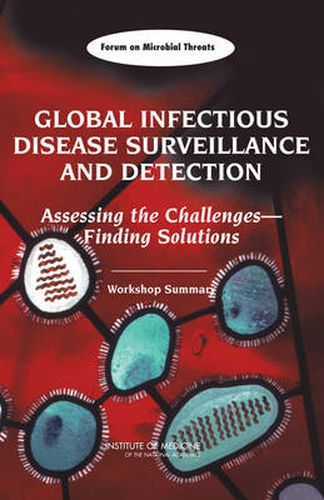Readings Newsletter
Become a Readings Member to make your shopping experience even easier.
Sign in or sign up for free!
You’re not far away from qualifying for FREE standard shipping within Australia
You’ve qualified for FREE standard shipping within Australia
The cart is loading…






Early detection is essential to the control of emerging, reemerging, and novel infectious diseases, whether naturally occurring or intentionally introduced. Containing the spread of such diseases in a profoundly interconnected world requires active vigilance for signs of an outbreak, rapid recognition of its presence, and diagnosis of its microbial cause, in addition to strategies and resources for an appropriate and efficient response. Although these actions are often viewed in terms of human public health, they also challenge the plant and animal health communities. Surveillance, defined as the continual scrutiny of all aspects of occurrence and spread of a disease that are pertinent to effective control , involves the systematic collection, analysis, interpretation, and dissemination of health data.
Disease detection and diagnosis is the act of discovering a novel, emerging, or reemerging disease or disease event and identifying its cause. Diagnosis is the cornerstone of effective disease control and prevention efforts, including surveillance.
Disease surveillance and detection relies heavily on the astute individual: the clinician, veterinarian, plant pathologist, farmer, livestock manager, or agricultural extension agent who notices something unusual, atypical, or suspicious and brings this discovery in a timely way to the attention of an appropriate representative of human public health, veterinary medicine, or agriculture. Most developed countries have the ability to detect and diagnose human, animal, and plant diseases. Global Infectious Disease Surveillance and Detection: Assessing the Challenges - Finding Solutions, Workshop Summary is part of a 10 book series and summarizes the recommendations and presentations of the workshop.
$9.00 standard shipping within Australia
FREE standard shipping within Australia for orders over $100.00
Express & International shipping calculated at checkout
Early detection is essential to the control of emerging, reemerging, and novel infectious diseases, whether naturally occurring or intentionally introduced. Containing the spread of such diseases in a profoundly interconnected world requires active vigilance for signs of an outbreak, rapid recognition of its presence, and diagnosis of its microbial cause, in addition to strategies and resources for an appropriate and efficient response. Although these actions are often viewed in terms of human public health, they also challenge the plant and animal health communities. Surveillance, defined as the continual scrutiny of all aspects of occurrence and spread of a disease that are pertinent to effective control , involves the systematic collection, analysis, interpretation, and dissemination of health data.
Disease detection and diagnosis is the act of discovering a novel, emerging, or reemerging disease or disease event and identifying its cause. Diagnosis is the cornerstone of effective disease control and prevention efforts, including surveillance.
Disease surveillance and detection relies heavily on the astute individual: the clinician, veterinarian, plant pathologist, farmer, livestock manager, or agricultural extension agent who notices something unusual, atypical, or suspicious and brings this discovery in a timely way to the attention of an appropriate representative of human public health, veterinary medicine, or agriculture. Most developed countries have the ability to detect and diagnose human, animal, and plant diseases. Global Infectious Disease Surveillance and Detection: Assessing the Challenges - Finding Solutions, Workshop Summary is part of a 10 book series and summarizes the recommendations and presentations of the workshop.